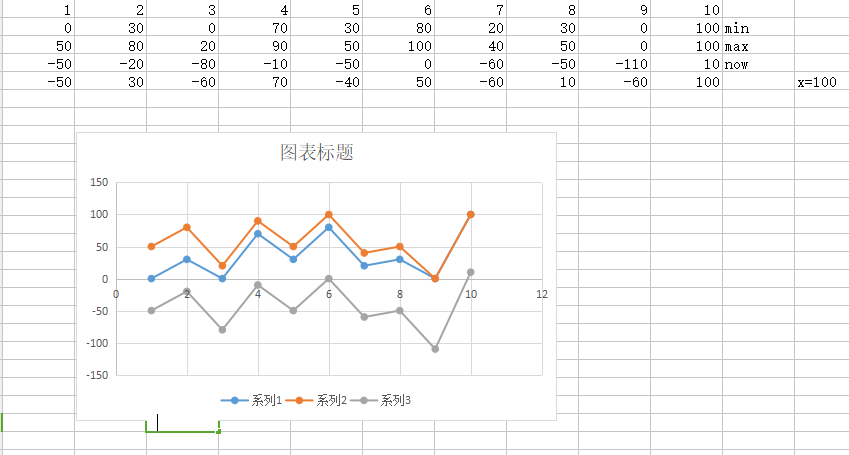问题 I: Sandglass
题目描述
We have a sandglass consisting of two bulbs, bulb A and bulb B. These bulbs contain some amount of sand. When we put the sandglass, either bulb A or B lies on top of the other and becomes the upper bulb. The other bulb becomes the lower bulb.
The sand drops from the upper bulb to the lower bulb at a rate of 1 gram per second. When the upper bulb no longer contains any sand, nothing happens.
Initially at time 0, bulb A is the upper bulb and contains a grams of sand; bulb B contains X−a grams of sand (for a total of X grams).
We will turn over the sandglass at time r1,r2,..,rK. Assume that this is an instantaneous action and takes no time. Here, time t refer to the time t seconds after time 0.
You are given Q queries. Each query is in the form of (ti,ai). For each query, assume that a=ai and find the amount of sand that would be contained in bulb A at time ti.
Constraints
1≤X≤109
1≤K≤105
1≤r1<r2<..<rK≤109
1≤Q≤105
0≤t1<t2<..<tQ≤109
0≤ai≤X(1≤i≤Q)
All input values are integers.
The sand drops from the upper bulb to the lower bulb at a rate of 1 gram per second. When the upper bulb no longer contains any sand, nothing happens.
Initially at time 0, bulb A is the upper bulb and contains a grams of sand; bulb B contains X−a grams of sand (for a total of X grams).
We will turn over the sandglass at time r1,r2,..,rK. Assume that this is an instantaneous action and takes no time. Here, time t refer to the time t seconds after time 0.
You are given Q queries. Each query is in the form of (ti,ai). For each query, assume that a=ai and find the amount of sand that would be contained in bulb A at time ti.
Constraints
1≤X≤109
1≤K≤105
1≤r1<r2<..<rK≤109
1≤Q≤105
0≤t1<t2<..<tQ≤109
0≤ai≤X(1≤i≤Q)
All input values are integers.
样例输入
180
3
60 120 180
3
30 90
61 1
180 180
样例输出
60
1
120
题目大意是给你一个数,每次可以对这个数加一个数或者减去一个数,直到它要求的时间为止。且这个数最大为x最小为0.
考虑维护初始数为0和x这两个特殊的数,则到某一时间,任何初始状态的数都会在维护的这两个数之间,有如下关系图:

再计算一个不经过维护的数now,now的初始值也是0,这样将now加上初始的数,如果此时now还在min到max区间内,那么这个now就是答案,否则答案就是min或者max。
这是因为,如果初始值按照正常的顺序进行加减运算且进行维护,那么它的曲线一定是在min曲线和max曲线之间,一旦它和某一条曲线在某一点重合,那么以后这条曲线就都可以用重合的曲线代替了,换言之,
就是初始值经过运算且维护后,和最大值(或最小值)运算且维护后的答案相同。

#include <bits/stdc++.h> #define N 100050 using namespace std; pair<int,int>team[N]; int main() { int x; int k; int t[N]={0}; scanf("%d %d",&x,&k); for(int i=1;i<=k;i++)scanf("%d",&t[i]); int q; scanf("%d",&q); for(int i=0;i<q;i++)scanf("%d %d",&team[i].first,&team[i].second); long long MIN=0,MAX=x,NOW=0,ki=1,sign=-1; for(int i=0;i<q;i++) { while(ki<=k&&t[ki]<=team[i].first) { long long now=t[ki]-t[ki-1]; now*=sign; sign*=-1; MIN+=now; MIN=max(MIN,(long long)0); MIN=min(MIN,(long long)x); MAX+=now; MAX=max(MAX,(long long)0); MAX=min(MAX,(long long)x); NOW+=now; ki++; } long long now=team[i].first-t[ki-1]; now*=sign; long long ans=team[i].second+NOW; if(ans<MIN)ans=MIN; if(ans>MAX)ans=MAX; ans+=now; ans=max(ans,(long long)0); ans=min(ans,(long long)x); printf("%d ",ans); } return 0; }
